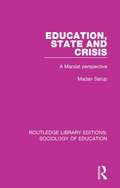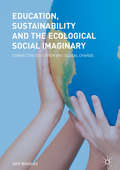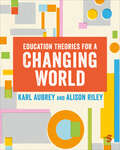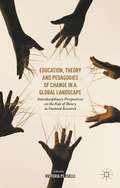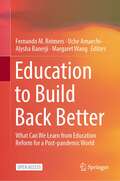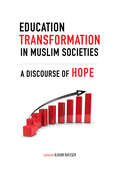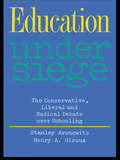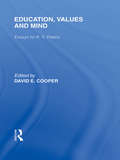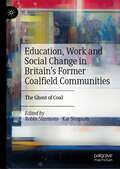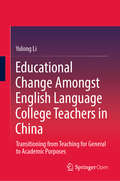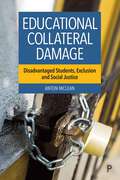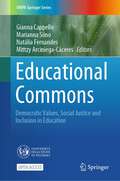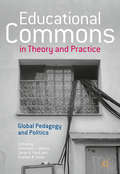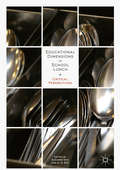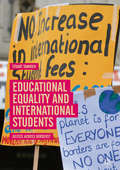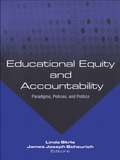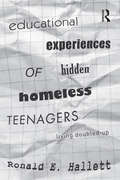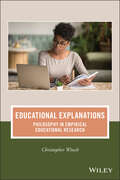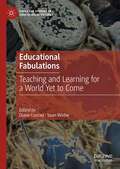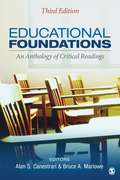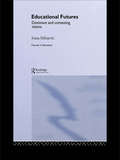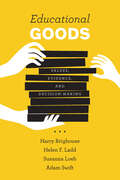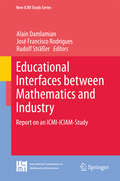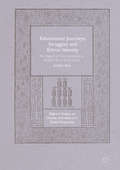- Table View
- List View
Education State and Crisis: A Marxist Perspective (Routledge Library Editions: Sociology of Education #47)
by Madan SarupFirst published in 1982, this work is a critical survey of contemporary educational debates and themes which took on new urgency and importance at the time. In particular, it explores the problematic nature of ‘progressive education’ and ‘discipline’; the changes in the labour process and youth unemployment; the nature of the state and its relationship with schooling; the growth of state intervention and the specific forms of discrimination suffered by women and black people. It argues that trends in education at the time can be explained by a Marxist analysis. It suggests that the changes taking place in schools and colleges were expressions of the contradictions of capitalism and of the state’s attempt to restructure education.
Education, Sustainability and the Ecological Social Imaginary: Connective Education And Global Change
by Jeff BucklesThis book analyses the evidence for global change, and suggests that the Earth is going through a profound transformation, caused in large part by human action. Land, oceans, polar regions and the atmosphere are all being deeply affected by the human population's lifestyle: what should the educational response be to these various aspects of global change? To answer this, the values of an ecological response are developed, leading to the notion of an 'Ecological Social Imaginary', which looks at how humans can change their way of living to one that is more in harmony with the planet that they live on and depend upon. To enable this, an ecological form of education, Connective Education, is proposed. This focuses on how the human and natural world can be connected for the benefit of humankind and all living and non-living entities, joining head, hand, heart and spirit to the web of life. It is argued that through Connective Education, a particular type of person is formed: one who is able to take their place in the human and natural world, and in this way truly connect with their planet. The book will be essential reading for those working in the fields of Education and Environmental Studies.
Education Theories for a Changing World
by Karl Aubrey Alison RileyHow can education be a vehicle for social change? This book looks at how different educational theories can be used to address complex and vital issues in society by exploring key concepts and challenging traditional thought through an educational lens. Each topic area is explored in both theoretical and practical terms with direct application to the classroom throughout. Key topics include: The climate crisis The Black Lives Matter movement The rise of right-wing populism The experience of LGBTQ+ students in school The impact of COVID-19 This is essential reading for anyone training to teach at any age phase and students undertaking the academic study of education.
Education Theories for a Changing World
by Karl Aubrey Alison RileyHow can education be a vehicle for social change? This book looks at how different educational theories can be used to address complex and vital issues in society by exploring key concepts and challenging traditional thought through an educational lens. Each topic area is explored in both theoretical and practical terms with direct application to the classroom throughout. Key topics include: The climate crisis The Black Lives Matter movement The rise of right-wing populism The experience of LGBTQ+ students in school The impact of COVID-19 This is essential reading for anyone training to teach at any age phase and students undertaking the academic study of education.
Education, Theory and Pedagogies of Change in a Global Landscape: Interdisciplinary Perspectives On The Role Of Theory In Doctoral Research
by Victoria PerselliEducation, Theory and Pedagogies of Change in a Global Landscape
Education to Build Back Better: What Can We Learn from Education Reform for a Post-pandemic World
by Fernando M. Reimers Uche Amaechi Alysha Banerji Margaret WangThis open access book examines the implications of the COVID-19 Pandemic for education systems and argues that major education reforms will be necessary, particularly in the Global South, to address the learning loss caused by the pandemic. To inform those reforms, knowledge about the implementation reforms in the Global South is necessary, and such knowledge is seriously lacking as the existing literature on the implementation of educational change focused principally in reforms in countries in the Global North. This book contributes to address this gap by examining five major education reforms in India, Egypt, Taiwan, Vietnam, and Senegal, and by presenting two novel approaches to climate change education using a bottoms up strategy of reform. The chapters examine the implementation process drawing on a theoretical model of educational change by Reimers (published in Educating Students to Improve the World by Springer in 2020). The book concludes discussing the implementation of such reforms as an evolutionary and learning process, characterized by four dimensions: the goals of the reform, the drivers of the reform, the reform strategy, and the mindsets about educational change which undergird the implementation strategy.
Education Transformation in Muslim Societies: A Discourse of Hope (Advancing Education in Muslim Societies)
by Nuraan Davids Mualla Selcuk Suhailah Hossien Bassam Abu Hamad Sulieman Mleahat Nora El-Bilawi Andreas M. Krafft Sher Afgan Tareen Afeefa Syeed Shelley Wong Tyron PittsHope is a complex concept—one academics use to accept the unknown while also expressing optimism. However, it can also be an action-oriented framework with measurable outcomes.In Education Transformation in Muslim Societies, scholars from around the world offer a wealth of perspectives for incorporating hope in the education of students from kindergarten through university to stimulate change, dialogue, and transformation in their communities. For instance, though progress has been made in Muslim societies on early education and girls' enrollment, it is not well documented. By examining effective educational initiatives and analyzing how they work, educators, policymakers, and government officials can create a catalyst for positive educational reform and transformation. Adopting strength-based educational discourse, contributors to Education Transformation in Muslim Societies reveal how critical the whole-person approach is for enriching the brain and the spirit and instilling hope back into the teaching and learning spaces of many Muslim societies and communities.Education Transformation in Muslim Societies is a copub with the International Institute of Islamic Thought.
Education Under Siege: The Conservative, Liberal and Radical Debate over Schooling (Critical Studies In Education)
by Stanley Aronowitz Henry A. GirouxFirst published in 1987. Routledge is an imprint of Taylor & Francis, an informa company.
Education, Values and Mind (International Library of the Philosophy of Education Volume 6): Essays for R. S. Peters
by David CooperR. S. Peters has not only been the major philosopher of education in Britain during second half of the twentieth century, but by common consent, he has transformed the subject and brought it into the mainstream of contemporary philosophy. The ten essays in this book attest to his influence whether by critical examination of his ideas or by original treatment of topics in which has has inspired a new interest.
Education, Work and Social Change in Britain’s Former Coalfield Communities: The Ghost of Coal
by Robin Simmons Kat SimpsonThis edited book presents a range of chapters written by new and established authors, drawing on a range of different perspectives and traditions to critically analyse education, work and social change in the former coalfields. Historically, coal was one of Britain’s major industries, employing over a million men at its peak. But mining was more than an occupation - it was a way of life for those living and working in coalfield communities. Work, leisure, family relations and other dimensions of social life were centred upon the coal industry and its related institutions such as trade unions, working-men’s clubs and welfare institutes. These communities have, however, undergone significant social and economic change over time, not least in terms of the pain and suffering associated with the Great Strike of 1984–85, the successive waves of pit closures which took place thereafter and the eventual demise of the coal industry. The book will be of interest to academics drawing on sociology, social policy, history, geography and other subject disciplines.
Educational Change Amongst English Language College Teachers in China: Transitioning from Teaching for General to Academic Purposes (Springerbriefs In Education Ser.)
by Yulong LiThis open access book provides anthropological insights into the arduous yet rewarding journeys involved in selected TESOL teachers’ pedagogical transition to teaching English for Academic Purposes (EAP) at universities in Shanghai, the largest metropolitan area in China. Applying a unique combination of ethnography and phenomenology, the book offers innovative new perspectives on teacher education research. Drawing on the latest language education theory, it outlines a practitioner-friendly approach to EAP literacy. Teacher readers will especially benefit from the case studies presented here, which provide role models for teacher change in educational reform, as well as advice on their academic careers. In addition to addressing a timely and important research gap on EAP teachers in non-Western countries, the book is the ideal choice for readers interested in an update on English education in China.
Educational Collateral Damage: Disadvantaged Students, Exclusion and Social Justice
by Anton McLeanWhy do disadvantaged students continue to get a poor deal as they progress through England’s education system? Challenging orthodox thinking about school exclusion, this book powerfully advocates for a fairer education system for disadvantaged students. It argues that the current conceptualisation of ‘exclusion’ – physically removing the student from the school – is insufficient. This approach fails to recognise the layers of exclusion that these students encounter. Students can be excluded within their schools (inner exclusion), not just from school (outer exclusion). Drawing on student experiences of exclusion and the perspectives of senior leaders, including the author who is a Head of School, this book demonstrates how we can create a fairer education system for disadvantaged students.
Educational Commons: Democratic Values, Social Justice and Inclusion in Education (UNIPA Springer Series)
by Gianna Cappello Marianna Siino Natália Fernandes Mittzy Arciniega-CáceresThis open access book presents the final findings from the case studies developed within the Horizon 2020 SMOOTH project Educational Spaces. Passing through Enclosures and Reversing Inequalities through Educational Commons. The overall objective of the project was to understand, develop, and accelerate the potential impact of education on reversing inequalities for active social inclusion of children and young people at risk in Europe, through introducing the emergent paradigm of the “commons” as an alternative value and action system in the field of education (preschools, schools, and after-school programs). SMOOTH critically draws out the implications of the commons for refiguring education and for social change in general, on a footing of equality, sharing, participation, togetherness, caring, and freedom. Universities, research laboratories, municipalities, NGOs, museums, and youth organizations, in different European countries, have worked together to achieve the aboveaim involving almost 200 educators and teachers, and 800 children, and providing interesting insights and suggestions on how to implement educational commons in many different educational contexts. The target audience comprises policymakers and education leaders, students from Education and Communication degrees, researchers, and educators from both formal and non-formal educational contexts.
Educational Commons in Theory and Practice: Global Pedagogy and Politics
by Alexander J. Means Derek R. Ford Graham B. SlaterIn this volume, critical scholars and educational activists explore the intricate dynamics between the enclosure of global commons and radical visions of a common social future that breaks through the logics of privatization, ecological degradation, and dehumanizing social hierarchies in education. In its institutional and informal configurations alike, education has been identified as perhaps the key stake in this struggle. Insisting on the urgency of an education that breaks free of the bonds of enclosure, the essays included in this volume weave together bright threads of radical thought into a vivid tapestry illustrating a critical framework for enacting a global educational commons.
Educational Dimensions of School Lunch: Critical Perspectives
by Suzanne Rice A. G. RudSchool lunch is often regarded as a necessary but inconvenient distraction from the real work of education. Lunch, in this view, is about providing students the nourishment they need in order to attend to academic content and the tests that assess whether content has been learned. In contrast, the central purpose of this collection is to examine school lunch as an educational phenomenon in its own right. Contributing authors—drawing from a variety of disciplinary traditions, including philosophy, sociology, and anthropology—examine school lunch policies and practices, social and cultural aspects of food and eating, and the relation among school food, the environment, and human and non-human animal well-being. The volume also addresses how school lunch might be more widely conceptualized and practiced as an educational undertaking.
Educational Equality and International Students: Justice Across Borders?
by Stuart TannockIn an increasingly globalised educational landscape, this book examines whether the principle of educational equality can be applied across nation state borders. Exploring the tension between the theory of educational equality and the reality that most educational institutions are rooted in local communities and national frameworks, the author thus probes the consequences for institutions, individuals and communities as the number of international students grows exponentially. A topic that has previously received limited attention, the author draws upon theoretical literature and an empirical study of how universities in the United Kingdom conceptualise and promote principles of educational equality for international as compared with home students. This pioneering work will be interest and value to students and scholars of international education, international students, educational equality and globalisation, as well as practitioners and policy makers.
Educational Equity and Accountability: Paradigms, Policies, and Politics (Studies in Education/Politics)
by Linda Skrla James Joseph ScheurichDespite the intense political attention that has been focused on accountability, on standardized testing, and on the equity effects of both accountability and testing, the great majority of recent debate in education policy circles has failed to attend to either the dynamism or complexity of these issues and has, instead, been carried out in a dualistic, good versus evil, fashion. In contrast, the scholarship collected in this important new volume is designed to move beyond the prevailing dualism and to push the discourse about accountability, testing, and educational equity in public schools usefully forward, and to provide a much-needed resource for researchers, policy makers, and practitioners.
Educational Experiences of Hidden Homeless Teenagers: Living Doubled-Up
by Ronald E. HallettHomeless youth face countless barriers that limit their ability to complete a high school diploma and transition to postsecondary education. Their experiences vary widely based on family, access to social services, and where they live. More than half of the 1.5 million homeless youth in America are in fact living "doubled-up," staying with family or friends because of economic hardship and often on the brink of full-on homelessness. Educational Experiences of Hidden Homeless Teenagers investigates the effects of these living situations on educational participation and higher education access. First-hand data from interviews, observations, and document analysis shed light on the experience of four doubled-up adolescents and their families. The author demonstrates how complex these residential situations are, while also identifying aspects of living doubled-up that encourage educational success. The findings of this powerful book will give students, researchers, and policymakers an invaluable look at how this understudied segment of the adolescent population navigates their education.
Educational Explanations: Philosophy in Empirical Educational Research (Journal of Philosophy of Education)
by Christopher WinchEDUCATIONAL EXPLANATIONS Educational Explanations is a comprehensive study of the main philosophical questions that confront empirical educational researchers. The book outlines the sense in which empirical educational research pursues truth and sets out and defends an account of its task as the offering of explanations for the many educational problems that claim our attention. The book goes on to look at the criteria for high quality research, the relationship between different methodological approaches and the scope and limits of intervention studies. At all stages detailed examples are presented to make the argument clearer. A distinctive feature of the book is the presentation of four detailed case studies, over four chapters, of influential educational research programmes that not only examine what they have achieved, but emphasise the conceptual issues that researchers are confronted with as they seek to provide explanations. The book goes on to examine the impact of empirical educational research on educational practice and on the practice of teachers in particular.
Educational Fabulations: Teaching and Learning for a World Yet to Come (Palgrave Studies in Educational Futures)
by Diane Conrad Sean WiebeThis highly original collection presents speculative fiction as fiction-based research to re-imagine education in the future. Given the particular convergence of economic and governmental pressures in educational institutions today, schools represent imaginative sites especially well-suited to interrogation through an SF lens. The relevance for education of the exploration and interrogation of themes related to technology, human nature, and social organization is evident; yet the speculative fiction approach is unique in its harnessing of creative capacities to envision alternatives. The contributions in this collection are generated from educational experience and research, drawing on scholarship in curriculum studies and teacher education and on the authors' experiences and imaginations as teachers, teacher educators, educational scholars, and human beings.
Educational Foundations: An Anthology of Critical Readings
by Alan S. Canestrari Bruce A. MarloweFULL DESCRIPTION Why Teach? Who Are Today's Students? What Makes a Good Teacher? Educational Foundations: An Anthology of Critical Readings answers these questions and more, providing an exciting alternative to other foundations textbooks. This anthology is aimed at students about to enter the teaching profession, those new to the profession, and anyone interested in carefully examining--and improving--schools and schooling. In this Third Edition, editors Alan S. Canestrari and Bruce A. Marlowe add new essays by classic and contemporary policy shapers and teachers. The readings are bold and refreshing, and their authors eschew unquestioning compliance. By taking a hard look at traditional educational practice, the contributors to this anthology serve as models for the kind of reflective practitioners that its editors hope that students will become while in the field.
Educational Futures: Dominant and Contesting Visions (Educational Futures Ser. #21)
by Ivana MilojevicThis book provides an overview and analysis of current tensions, debates and key issues within OECD nations, particularly Australia, the USA, Canada and the UK, with regard to where education is and should be going. Using a broad historical analysis, it investigates ideas and visions about the future that are increasingly evoked to support arguments about the imminent demise of the dominant modern educational model. Focusing neither on prediction nor prescription, this text suggests the goal is an analysis of the ways in which the notion of the future circulates in contemporary discourse. Five specific discourses are explored: globalisation; new information and communications technologies; feminist; indigenous; and spiritual. The book demonstrates the connections between particular approaches to time, visions of the future, and educational visions and practices. The author asserts that every approach to educational change is inherently based on an underlying image of the future.
Educational Goods: Values, Evidence, and Decision-Making
by Harry Brighouse Helen F. Ladd Susanna Loeb Adam Swift“An ambitious effort that succeeds in providing a fundamentally new way to talk about and . . . think about policy choices in education.” —Jeffrey R. Henig, Teachers College, Columbia UniversityWe spend a lot of time arguing about how schools might be improved. But we rarely take a step back to ask what we as a society should be looking for from education—what exactly should those who make decisions be trying to achieve?In Educational Goods, two philosophers and two social scientists address this very question. They begin by broadening the language for talking about educational policy: “educational goods” are the knowledge, skills, and attitudes that children develop for their own benefit and that of others; “childhood goods” are the valuable experiences and freedoms that make childhood a distinct phase of life. Balancing those, and understanding that not all of them can be measured through traditional methods, is a key first step. From there, they show how to think clearly about how those goods are distributed and propose a method for combining values and evidence to reach decisions. They conclude by showing the method in action, offering detailed accounts of how it might be applied in school finance, accountability, and choice. The result is a reimagining of our decision making about schools, one that will sharpen our thinking on familiar debates and push us toward better outcomes.“Every education decision-maker—and every education researcher—would benefit from reading this book.” —David N. Figlio, School of Education and Social Policy, Northwestern University“Imaginative, informative, and unfailingly constructive.” —Michael S. McPherson, co-author of Lesson Plan: An Agenda for Change in American Higher Education
Educational Interfaces between Mathematics and Industry
by Alain Damlamian José Francisco Rodrigues Rudolf SträßerThis book is the "Study Book" of ICMI-Study no. 20, which was run in cooperation with the International Congress on Industry and Applied Mathematics (ICIAM). The editors were the co-chairs of the study (Damlamian, Straesser) and the organiser of the Study Conference (Rodrigues). The text contains a comprehensive report on the findings of the Study Conference, original plenary presentations of the Study Conference, reports on the Working Groups and selected papers from all over world. This content was selected by the editors as especially pertinent to the study each individual chapter represents a significant contribution to current research.
Educational Journeys, Struggles and Ethnic Identity
by Xinyi WuThis book examines how state schooling in China has economically, culturally, and ideologically had an impact on and gradually transformed a traditional Muslim Hui village in rural Northwestern China. By discussing the interpretation and appropriation of dominant educational discourse of "quality" in the rural context, it illustrates the dichotomies of poverty and prosperity, civility and uncivility, and religiosity and secularity as they are perceived and understood by teachers, parents and students. Based on an original ethnographic research conducted in a secondary school, it further touches upon Muslim Hui students' negotiations of filial, rural, and ethnoreligious identities when they struggle to seek a life of their own in the journey to prosperity. The book introduces audiences to multiple ways in which Muslim Hui students construct and negotiate identities through state schooling, especially the educational heterogeneity experienced by various Muslim youth. It also captures the changing rural-urban dynamic as state schooling continues to guide local formal educational activities as well as create tensions and confusions for both teachers and parents. Most importantly, the book challenges stereotypes about Muslim Hui students in Northwest China being assimilated into the mainstream culture by demonstrating how local Muslims live, study, pray, and fulfil the five pillars of Islam. It will be highly relevant to students and researchers in the fields of education, anthropology, sociology, and religious studies.
